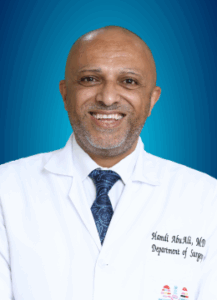Overview of the specialization
Cardiovascular and Thoracic Surgery Department
Jordan Hospital is a leading regional tertiary center for specialized care in treating patients with cardiovascular and thoracic diseases. The cardiac surgery program began with the establishment of the hospital in 1996 by Dr. Suhail Saleh, and it remains one of the busiest programs in the private sector, with the latest technologies and continuous advancement.
Diseases Treated by the Department
- Coronary artery atherosclerosis
- Aortic valve diseases
- Mitral valve diseases
- Tricuspid and pulmonary valve diseases
- Aneurysms and dilations of vessels in the aorta
- Cardiac electrical disturbances
- Treatment of heart failure or insufficiency
Treatments and Cardiac Surgeries
- Grafting and performing coronary artery bypasses (CABG)
- Aortic valve replacement and repair
- Mitral valve replacement and repair
- Aortic aneurysm surgery, including (restructuring and forming the aortic root, aortic arch, and repair of the thoracic and abdominal aorta through surgery and catheterization)
- Atrial fibrillation surgery
Recent Developments
All these operations are traditionally performed through open chest surgery using a heart-lung machine. However, the latest advancement in the department is the addition of minimally invasive endoscopy (limited intervention) and performing these operations through a small incision (5-6 cm) on the right chest or percutaneously via catheterization. These operations include:
- Aortic valve replacement and repair using endoscopy
- Mitral valve replacement and repair using endoscopy
- Implanting cardiac electrical wires for the heart wall using endoscopy
- Pericardial window using endoscopy
- Aortic valve replacement via catheterization (TAVR)
- Mitral valve replacement via catheterization (TMVR)
- Mitral valve repair by clipping the valve leaflets via catheterization (Mitraclip)
The department has also seen continuous technical developments, with the addition of a new heart-lung machine in the operating room, a hybrid operating room system, minimally invasive endoscopy tools, and post-surgery cardiac pacing devices. Our surgical team has been fully trained on the latest technologies, bringing over 30 years of experience, and transesophageal echocardiography has also been integrated into every open-heart surgery following international care standards. Our patients now recover post-surgery in the cardiac intensive care unit, which is part of the recently renovated general intensive care unit using the latest technologies.
Thoracic Surgery Overview
The thoracic surgery clinics at Jordan Hospital provide the highest levels of quality and the latest technologies in diagnosing and treating all thoracic, mediastinal, pleural cavity, and esophageal diseases. We pride ourselves on being a leading center in providing the latest minimally invasive endoscopy techniques for treating such diseases, performed by thoracic surgeons who have specialized training and advanced fellowships in thoracic and cardiac endoscopic surgeries from the United States. We are the only center offering video-assisted thoracic surgery through a single port using endoscopy for treating hydatid cysts via advanced surgical endoscopy and for most thoracic surgical diseases, performing operations while the patient is awake without the need for anesthesia or an endotracheal tube for high-risk patients.
Operations and Diseases Treated by the Department
- Lung Diseases:
- Malignant and benign lung tumors using advanced surgical endoscopy
- Early detection program for lung diseases and tumors
- Lung volume reduction surgery for chronic obstructive pulmonary disease patients using advanced surgical endoscopy
- Pleural adhesion surgery using advanced surgical endoscopy
- Treatment of pleural effusion using advanced surgical endoscopy
- Treatment of thoracic injuries and accidents
- Surgical treatment for complications of tuberculosis using advanced surgical endoscopy
- Treatment of hydatid cysts using advanced surgical endoscopy
- Treatment of pulmonary fibrosis and biopsy using advanced surgical endoscopy
- Mediastinal Diseases:
- Thymoma resection and treatment of myasthenia gravis using advanced surgical endoscopy
- Lymphomas
- Congenital and hereditary tumors
- Sarcoidosis and tuberculosis
- Mediastinoscopy and lymph node sampling
- Mediastinal infection and abscess drainage using advanced surgical endoscopy
- Resection of laryngotracheal stenosis and stenting
- Pleural Cavity Diseases:
- Treatment of pleural effusion
- Treatment of pneumothorax
- Chest Wall:
- Correction and treatment of pectus excavatum and pectus carinatum
- Chest wall reconstruction and plating and sternum using metal plates and meshes
- Esophageal Diseases:
- Resection of malignant and benign esophageal tumors using advanced surgical endoscopy
- Repair of esophageal perforation using advanced surgical endoscopy
- Treatment of esophageal stricture, diverticulum, and deformity using advanced surgical endoscopy
Residency Program in the Department
Resident doctors in the general surgery department rotate in the cardiovascular and thoracic surgery department, allowing them to handle cardiovascular and thoracic diseases and their treatment. The program enables them to participate in open thoracic operations, thoracic surgical endoscopy, open-heart surgeries, and ongoing research in this field.
Research in the Cardiovascular and Thoracic Surgery Department
Research is an integral part of our department, and many abstracts and research papers have been presented in national and international societies such as the American College of Surgeons Clinical Congress.
Staff of the Cardiovascular and Thoracic Surgery Department
Our team follows a multidisciplinary patient-centered approach. Cardiologists, pulmonologists, nutritionists, nursing staff, and cardiovascular and thoracic surgeons focus all their expertise around each patient to provide advanced treatment for each patient individually


